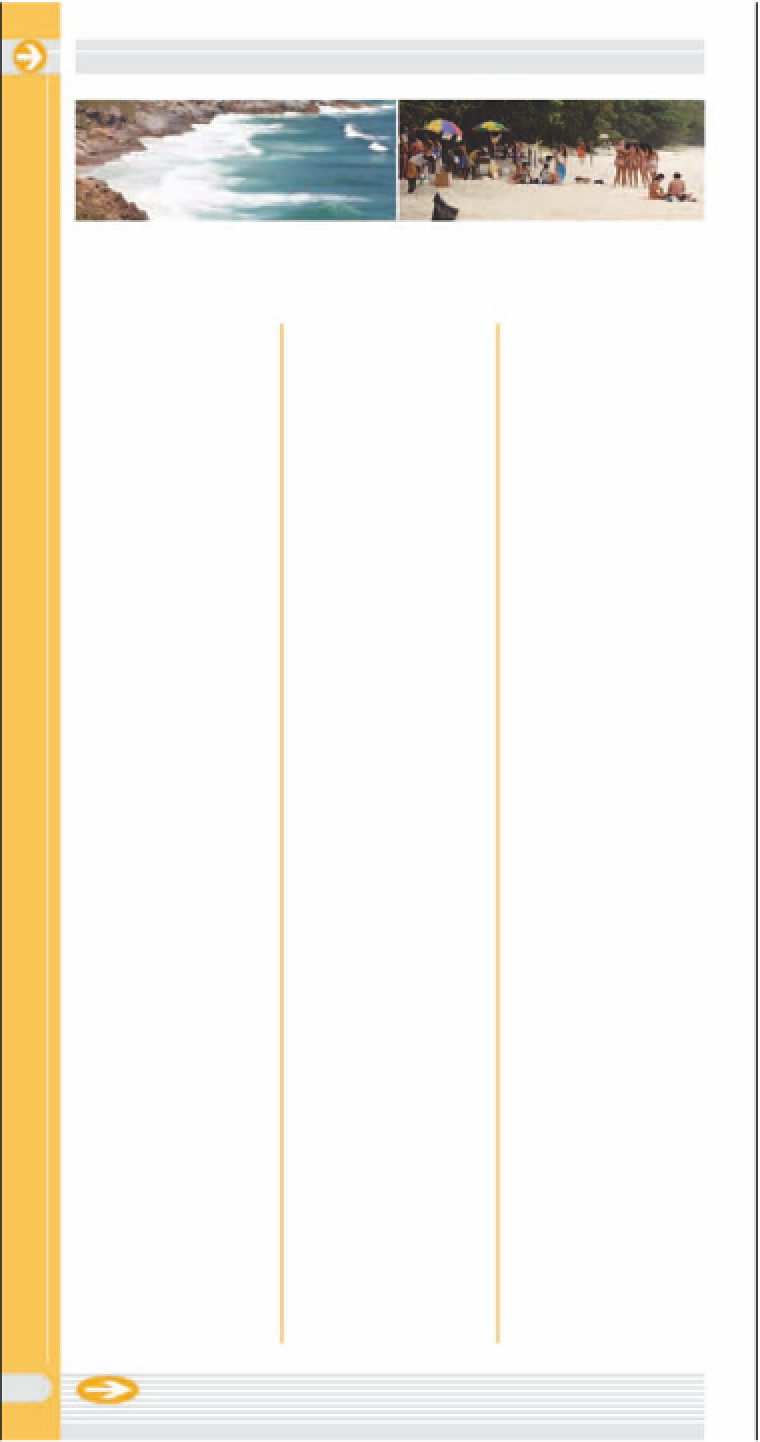Travel Reference
In-Depth Information
Left
Powerful waves hitting the shore
Right
Vacationers at the beach
Health and Security
!
Emergencies
$
Police
*
Swimming Safety
The main emergency
phone numbers in Rio
de Janeiro city are as
follows: Fire Department
(Bombeiros) - 193; Police
(Polícia) - 190; Ambu-
lance (Ambulância) - 192.
Although emergency
numbers cater primarily
to Portuguese speakers,
the Tourist Police, on
(021) 3399 7170, speak
good English.
Rio's police force has
only one English speak-
ing office, specifically for
tourists in Leblon - at the
far southern end of
Ipanema. At other police
stations, generally only
Portuguese is spoken.
%
Crime
There are strong
currents and rip tides on
many of Rio's beaches
and the water is chilly.
Look for lifeguard flags
indicating unsafe areas
for swimming. Swimming
at some of the smaller,
more obscure beaches
is not advised as
industrial outputs pour
into the bay from Rio's
northern suburbs and
industrial operations.
Stick to the beaches at
Ipanema and beyond.
(
Discretion
Petty theft is common
in the city, especially on
buses. Credit cards and
other valuables are best
stored in a zipped bag or
left at the hotel. Muggings
are also not infrequent. It
is best not to challenge
the perpetrators. Avoid
long walks after dark and
try to use ATMs in malls
and supermarkets rather
than on the street.
@
Pharmacies
Pharmacies, or
farmácias
, can be found
throughout Rio, and
hotels can usually advise
on where to find those
that offer a 24-hour
service. Many prescrip-
tion drugs, including
antibiotics, are available
over the counter in Brazil.
As in Europe and North
America, cosmetics,
insect repellents, and
sun protection can be
purchased at pharmacies.
£
Travel Insurance
Rio de Janeiro may
appear liberal but it is
actually quite
conservative. Going
topless is regarded as
extremely vulgar on Rio
beaches and could lead
to arrest.
Samba
and
forró
involve very close
dancing that is regarded
as no more sexual than
dancing apart to club
music. Brazilians become
offended when such
dancing is confused with
a proposition.
)
Drinking Water
^
Consulates
Foreign embassies
are all in Brazil's capital,
Brasília, but most coun-
tries do have consulates
in Rio. Foreign tourists
who have a lost or dama-
ged passport should
contact their consulate.
d
USA: www.consul
adodoeua-rio.org.br •
Australia: www.dfat.gov.au/
missions/countries/brri.html
• UK: www.reinounido.org.br
&
Beach Safety
Visitors to Brazil
should arrange travel
insurance in advance.
Robberies and snatch
thefts are not uncommon
and crimes should be
reported immediately
at a
delegacia
(police
station). When reporting
a crime, make sure to
request an official printed
report. Health insurance
is necessary as
ambulances take patients
without insurance to
public hospitals, where
services and conditions
are poor.
Tap water in Rio is
drinkable but not pleas-
ant. Bottled water is
plentiful and cheap but
bring your own bottle as
plastic waste is a huge
problem. Many visitors
buy a large bottle and
use it to fill their own
container. Most hotel
lobbies and restaurants
have a 5-gallon (20-liter)
water dispenser with
free chilled water.
During the day, Rio's
beaches are generally
well policed, but people
should nonetheless bring
as little as possible with
them and stay alert.
Personal items left on
the beach are likely to
be stolen, especially
when it gets crowded.
108



































